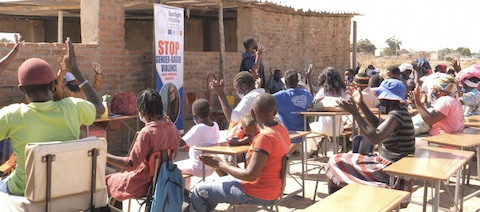
GCED Basic Search Form
Quick Search
You are here
News

Ruvheneko is a woman with albinism from Bulilima. She was raped at the age of 17 and got pregnant and her parents sent her away to her husband. Her husband’s family disliked her and they kept taunting him about marrying a woman with albinism. Finally their relationship changed as he succumbed to the pressure. He started beating her and withholding financial support from her. Eventually she could not stand the abuse, she left him. She is now venturing in vending but people do not buy things from her due to stigma towards albinism.
Such experiences are not exceptional – they happen recurrently in many communities in Zimbabwe, affecting many girls and women with different disabilities. The majority of violence is perpetuated by the family or close community members and goes unreported. Globally, women and girls with disabilities continue to face intersecting forms of discrimination due to their gender, disability, social and cultural norms as well as religious beliefs. These factors increase their vulnerability and put them at a higher risk of GBV, SGBV, and Harmful Practices and in most cases denial of Sexual and Reproductive Health Rights and services. Community leaders as the custodians of traditional practices are critical in any intervention that seeks to redress cultural and social norms.
Within the EU-funded Spotlight Initiative, UNESCO has worked closely with Organizations of Persons with Disabilities (OPDs) to open spaces for the community members and leaders to share information and advices, to engage in a change of perception and practices, and to set up solidarity schemes to address this discriminatory and violent social ill. The National Association of Societies for the Care of the Handicapped (NASCOH), Deaf Women Included (DWI), and Disabled Women Support Organization (DWSO) conducted meaningful engagement of persons with disabilities, community and religious leaders, traditional chiefs, and school heads to impel a culture of inclusivity of women and girls with disabilities in their communities, while addressing sexual gender-based violence, gender-based violence, sexual reproductive health rights and harmful practices.
Through this partnership, over 600 women and girls with disabilities have been capacitated on GBV and SRHR. The beneficiaries are women with disabilities in marginalized areas in eight districts targeted by the Spotlight. Speaking at the Hopley training for women and girls with disabilities, one of the participants with a physical impairment indicated that previously GBV and SRHR activities did not reach them, but through the Spotlight Initiative, they were now accessing this critical information. Their capacity to identify and respond to GBV cases has been strengthened and now they know how to respond when they are abused. Through these trainings to build GBV capacity for women with disabilities, the OPDs were also able to identify SGBV cases that had not been reported and were able to offer victims the support services needed in response to SGBV. DWI has also gone further to develop case management system and referral pathways for victims of GBV with disabilities. This has been done with the support of the Ministry of Women Affairs, Community, Small and Medium Enterprise, Ministry of Public Service, Labour and Social Welfare as well as ZRP Victim Friendly Unit.
In Guruve the stakeholders of this initiative have also had follow up meetings with the victims. OPDs have also been able to set up community support groups. These support groups currently have been established in four districts that NASCOH has been implementing with the support of Zimbabwe National Association of Mental Health (ZIMNAH). DWSO through these interventions has been able to document the GBV and SRHR experiences of women and girls with disabilities and create a database that can be used in the inclusion of persons with disabilities in community initiatives.
An estimated 300 Community leaders who include chiefs, village heads, religious leaders, health care workers and school heads have been engaged by the OPDs. Through these interventions, the perceptions of community leaders towards disability have changed. Most traditional leaders made a commitment to ensure the inclusion of women with disabilities at community gatherings and ensure their needs are addressed. Speaking at a community dialogue in Shamva, one councillor indicated that the interventions had changed his perceptions about disability.
After the interventions by DWI in our community, the way I view disability has changed. At one point I was surprised to see a woman with a disability pregnant but now I have been equipped with the knowledge that persons with disabilities are also sexual and also need SRH services.
-- Councillor from Shamva District
Through this experience, the Spotlight Initiative has given persons with disabilities and OPDs that represent them an opportunity to lead on interventions on the plight on women and girls with disabilities in rural areas and to cover the gaps that existed in GBV initiatives that usually do not involve women with disabilities in rural areas. The resources and networks produced will be made available as invaluable resources for the local and national stakeholders, as well as for the Spotlight Initiative team, for a continuous fight against intersectional discrimination and violence in Zimbabwe.
URL:
